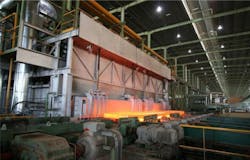British Steel probing use of Green H2 in Decarbonizing Reheating Furnaces
British Steel is collaborating with energy firm EDF UK, University College London and the Materials Processing Institute to study the use of green hydrogen instead of natural gas for reheating furnaces.
The project aligns with the steelmaker’s pledge to deliver net-zero steel by 2050 and reduce CO2 intensity by 2030 and 2035.
"As an energy intensive industry with hard to abate emissions, the steel industry offers the potential for large CO2 emission savings through fuel switching from natural gas to hydrogen,” British Steel’s Environment & Sustainability Director, Lee Adcock, said. “This study is, therefore, a vital and hugely exciting step on our journey to developing the technology needed to transform the way we, and other steel manufacturers, operate.”
The study links into the Tees Green Hydrogen project, which uses electricity from a Teesside Offshore Wind Farm and a new solar farm, which will be developed by EDF Renewables UK near Redcar. This electricity will be used to power its hydrogen electrolyzer.
In steelmaking, re-heating furnaces are used for heating up steel slabs before entering them into the hot rolling phase. It is perhaps the most carbon-intensive process other than the blast furnace, according to IEEE (Institute of Electrical and Electronic Engineers).
Related stories
GE gas-fired turbines to power Algoma Steel's shift to Electric Arc Furnaces
U.S. DOE seeking shareholder input on planned Clean Hydrogen Hubs
Subscribe to our free newsletter for more insights into the C&I Energy Transition
"As part of the feasibility study, EDF UK R&D will carry out a technoeconomic assessment of the methodology and practicality of delivery of green hydrogen for fuel switching into the steel manufacturing process, and British Steel will assess the technical implications of the fuel switch on both product and process. Together the partners will carry out an assessment of the economic viability and environmental impact of switching from natural gas to hydrogen in defined aspects of steel manufacturing. The Materials Processing Institute and UCL will also play a role in aiding in the assessment of the product and process viability for British Steel.”
The project could help enable industries to reduce emissions, save on energy bills and support jobs, said Energy and Climate Change Minister Greg Hands.
If the study is successful, British Steel will undertake an industrial-scale demonstration of the technology. It will be deployed across its operations and may also be adopted by other UK steelmakers.
About the Author
EnergyTech Staff
Rod Walton is head of content for EnergyTech.com. He has spent 17 years covering the energy industry as a newspaper and trade journalist.
Walton formerly was energy writer and business editor at the Tulsa World. Later, he spent six years covering the electricity power sector for Pennwell and Clarion Events. He joined Endeavor and EnergyTech in November 2021.
He can be reached at [email protected].
EnergyTech is focused on the mission critical and large-scale energy users and their sustainability and resiliency goals. These include the commercial and industrial sectors, as well as the military, universities, data centers and microgrids.
Many large-scale energy users such as Fortune 500 companies, and mission-critical users such as military bases, universities, healthcare facilities, public safety and data centers, shifting their energy priorities to reach net-zero carbon goals within the coming decades. These include plans for renewable energy power purchase agreements, but also on-site resiliency projects such as microgrids, combined heat and power, rooftop solar, energy storage, digitalization and building efficiency upgrades.
